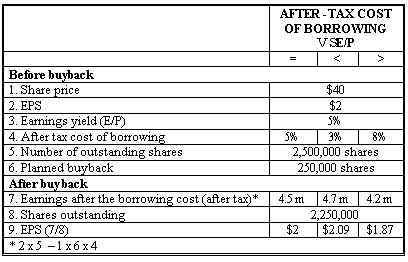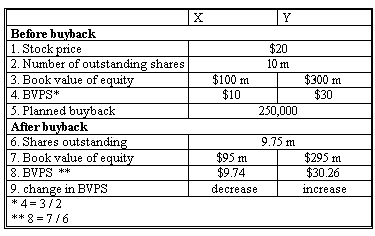Do you want BuboFlash to help you learning these things? Or do you want to add or correct something? Click here to log in or create user.
Subject 4. Financial Statement Effects of Repurchases
#cfa #cfa-level-1 #corporate-finance #dividends-and-shares-repurchase-basics #has-images
A share repurchase should be equivalent to the payment of cash dividends of equal amounts in their effect on shareholders' wealth, all things being equal. This means the taxation and information content of cash dividends and share repurchases do not differ.


Examples
Example 1: Equivalent Share Repurchase and Cash Dividends
Company XYZ is expected to have $10 million in earnings. It plans to distribute $6 million to shareholders through cash dividends or stock repurchases. The current stock price is $20. The company has 1 million shares outstanding. The stock repurchase can be completed at $20.
- Cash dividends
- Per share dividend: $6 million / 1 million = $6
- Per share value: $20 - $6 = $14
- Total wealth from ownership of one share: $14 + $6 = $20
- Share repurchase
- Number of shares to be repurchased: $6 million / $20 = 0.3 million
- Post-repurchase share price: [1,000,000 x $20 - $6,000,000] / (1,000,000 - 300,000) = $20
- Total wealth from ownership of one share is also $20.
Example 2: A Share Repurchase that Transfers Wealth
Continuing with the above example, assume that the company has to pay a premium to repurchase shares from a wealthy investor: the stock repurchase price can be completed at $25 per share.
- Share repurchase
- Number of shares to be repurchased: $6 million / $25 = 0.24 million
- Post-repurchase share price: [1,000,000 x $20 - $6,000,000] / (1,000,000 - 240,000) = $18.42
- Shareholders other than the wealthy investor would lose $20 - $18.42 = $1.58 for each share owned. Therefore, the transaction effectively transfers wealth from the other shareholders to this individual investor.
Example 3: Share Repurchases Using Borrowed Funds: The Effect on EPS When the After-Tax Cost of Borrowing Equals E/P
ABC Company wants to borrow $10 million to repurchase shares.

With the after-tax cost of borrowing equal to the earnings yield (E/P) of the shares, the share repurchase has no effect on the company's EPS. However, if the after-tax cost of borrowing is greater (less) than the earnings yield, EPS will be less (more) than its pre-repurchase level.
A share repurchase may cause the P/E ratio to change as well. For example, if a share repurchase causes a company's financial leverage to change, the financial risk of the company's earnings stream changes and the P/E ratio post-repurchase may change from its pre-repurchase level to reflect the change in risk.
Example 4: The Effect of Share Repurchase on Book Value per Share
Company X and Company Y have announced a $5 million buyback.

This example shows that book value per share (BVPS) will either increase or decrease depending on whether share price is higher or lower than BVPS. When share price is greater (less) than BVPS, BVPS will decrease (increase) after a share repurchase.
If you want to change selection, open original toplevel document below and click on "Move attachment"
Summary
| status | not read | reprioritisations | ||
|---|---|---|---|---|
| last reprioritisation on | suggested re-reading day | |||
| started reading on | finished reading on |
Details
Discussion
Do you want to join discussion? Click here to log in or create user.